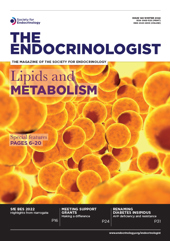Melanie Watson is Consultant (Lead) Genetic Counsellor at Wessex Clinical Genetics Service, and Lead for the Wessex Familial Hypercholesterolaemia Service, based in Southampton and working across the Wessex region. This service was launched in July 2014 and has been fully commissioned since July 2016. We talked to her about what she undertakes in the course of her job.
What is involved in your role?
We are at the dawn of a genomics era within the NHS. In my post, I am responsible for the clinical leadership, education and training, and research and development of the Wessex Familial Hypercholesterolaemia Service. This offers genomics and cascade genetic testing to individuals and families affected by this condition.
What does clinical leadership entail?
As a clinical lead, I anticipate and respond to the changing demands on this service. I ensure that the service, and the nurses who work in familial hypercholesterolaemia, have the capacity and support they need to provide a patient- and family-centred approach to genomic testing for the condition. In recent months, a number of external factors have changed the way in which the service has been delivered.
For instance, the COVID pandemic meant that the nurses were temporarily redeployed to the frontline. This required the familial hypercholesterolaemia service to be temporarily suspended. On its relaunch, we provided consultation on a virtual platform to address the restrictions of the pandemic.
‘As we look to the future and hopefully identify individuals with familial hypercholesterolaemia at a younger age, it will be important to monitor the clinical effectiveness, acceptability and costeffectiveness of treatment in this age group.’
The ‘additional findings’ from the 100,000 Genomes Project have also had an impact.1 As part of participants’ consent for the 100,000 Genomes Project, they were asked if they wanted us to look for additional health information in their genome sequence (called ‘additional findings’). They were informed that ‘these conditions could be serious, but the NHS can already treat them or use screening to pick them up at the earliest stage possible’. Familial hypercholesterolaemia was included in this group of conditions. Although the patients gave consent, the realisation that they were affected by another genomic condition was sometimes a challenging path to navigate for both individuals and families.
Finally, with the clinical introduction of new treatments such as PCSK9 inhibitors, the service has had to respond by establishing PCSK9 clinics to monitor and support the implementation of these treatments with a genomic basis.
How have you been involved in education and training?
The NHS Long Term Plan2 was introduced in January 2019, to expand access to genetic testing for familial hypercholesterolaemia, with the aim to improve identification from 7% to 25% in the next five years. Alongside this, a National Education Programme (NEP) for familial hypercholesterolaemia was launched. As a member of this NEP group, I helped develop the competency framework for familial hypercholesterolaemia and mapped a training and education programme against these competencies, delivering a national workshop.
This work is ongoing, with the development of Massive Open Online Courses to future-proof this programme.
At a regional level, the Hampshire and Isle of Wight Integrated Care Board (ICB) has responded to the new Directed Enhanced Service (DES) Indicators for familial hypercholesterolaemia, with the aim of increasing the identification of the disease in primary care. I worked proactively with the ICB and the Academic Healthcare Science Network to develop an intervention brief incorporating a clinical pathway to respond to this DES to identify familial hypercholesterolaemia in primary care. This has been supported by educational webinars for GPs and allied healthcare professionals who have a role to play in this primary care clinical pathway.
Tell us about your role in research and development
When establishing this service, it was important to engage with key stakeholders to develop sound economic modelling, ensuring its sustainability.3 This work is ongoing as the commissioning structures change.4 It has been subject to a National Institute for Health and Care Research Health Technology Assessment, to investigate the cost effectiveness of cascade testing for familial hypercholesterolaemia in primary care, soon to be published.
As we look to the future and hopefully identify individuals with familial hypercholesterolaemia at a younger age (in childhood), it will be important to monitor the clinical effectiveness, acceptability and cost-effectiveness of treatment in this age group, and also to ensure the training and support of paediatric endocrinologists to provide this treatment and care.
It is a privilege to help steer this service into the genomics era, and to have such a multifaceted role as a Consultant Genetic Counsellor for familial hypercholesterolaemia.
Melanie Watson
Consultant (Lead) Genetic Counsellor, Wessex Clinical Genetics Service, and Lead, Wessex Familial Hypercholesterolaemia Service, Southampton
REFERENCES
1. Genomics England 2022 Additional Findings: 100,000 Genomes Project www.genomicsengland.co.uk/initiatives/100000-genomes-project/additional-findings.
2. NHS 2019 The NHS Long Term Plan www.longtermplan.nhs.uk/publication/nhs-long-term-plan.
3. Pears R et al. 2014 Open Heart 1 e000015.
4. Kerr M et al. 2017 European Heart Journal 38 1832–1839.






